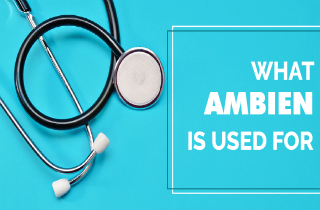Ambien (zolpidem) is used to treat sleep disorders. Taking Ambien slows activity in the brain, allowing the body to relax so that a person can get a full night’s rest. Ambien prescription dosage is normally 10 mg once daily, but does Ambien work for everyone? Not always. More here on Ambien uses and side effects, as well as what defines illegal Ambien use. We invite your questions about Ambien at the end.
Ambien uses
Ambien is a prescription sedative that’s given to treat insomnia difficulty falling asleep, or repeated waking up during the night. Doctors typically only prescribe Ambien for a few weeks, because the main ingredient, zolpidem, can have some significant negative side effects.
Some people also try to use Ambien recreationally to get high or enhance the sedative effects of other drugs. While euphoria is a known side effect of Ambien, when used correctly, the drug only causes this side effect in about 1% of users. When taken in higher-than-normal doses, or when users stay awake instead of going to bed after taking the medication, zolpidem can create a high and cause hallucinations. But abusing Ambien is dangerous because of the memory loss and lack of coordination it causes. Ambien is also potentially lethal if it’s taken in conjunction with alcohol or other drugs.
Ambien uses and side effects
While Ambien can be incredibly helpful for people suffering from insomnia, it’s not without it’s risks. Some of the major side effects of Ambien use include:
- dizziness
- drowsiness
- mood changes (depression, anxiety)
- confusion, lack of coordination
- memory loss
- lightheadedness
- unsteady balance
- unusual dreams
- acting out activities in sleep
While some of these side effects are minor, there are a few – mood changes and acting out activities in sleep in particular – which can be extremely dangerous. Some people will walk, cook, drive, and even have sex in their sleep while on Ambien, and wake up with no memory of their actions. This puts them at risk of accidents, and people who experience this side effect need to stop taking Ambien immediately.
Illegal Ambien use
It is illegal to use Ambien without a valid prescription. Likewise, it is illegal to write or obatin a fraudulent prescription to get Ambien. Finally, it is illegal to distribute your Ambien to friends, families or associates. In fact, selling or giving away Ambien can cause severe harm to others. The penalties associated with the abuse or illegal distribution of Abmien depend on state/federal law but generally include prison sentences and fines.
Problems with Ambien
After long-term use, Ambien should never be stopped abruptly or without a doctor’s guidance. If you initially began using Ambien to treat insomnia, and want to stop taking the medication, speak to your doctor about your options. A tapered dosing schedule can help you gradually reduce your use of Ambien. Ambien stays in your system how long? Although Ambien is absorbed quickly by the body, traces of Ambien can be detected in urine screens for days after use and even for weeks in hair samples.
Still, Ambien is an addictive drug which can cause strong cravings and drug-seeking behavior. If you are addicted to Ambien, you will be unable to simply quit or go without the drug. But there is help available. Talk with your family doctor or seek help from a drug addiction specialist to learn more about treatment options and living life without Ambien.
Questions about Ambien uses
Do you still have questions about the uses for Ambien? Please leave your questions here. We do our best to try to respond to Ambien use questions personally and promptly.









Related Posts